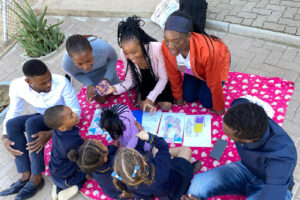Mama Penee: Transcending the Genocide by Uazuvara Ewald Kapombo Katjivena
Jahorora Petronella Inaavinuise, better known as Mama Penee, was only eleven years old when her parents were murdered in the genocidal war of 1904-1908 in Namibia. When a German soldier waved her away from the scene, she realised that it was her destiny to live. She mastered the art of survival, finding food and water while avoiding danger in what at the time was known as central German South West Africa.
The newest title from UNAM Press, Mama Penee: Transcending the Genocide, launched on 25 February 2020, gives an account of what transpired in Mama Penee’s life, narrated by her grandson, the author, Mr Uazuvara Ewald Kapombo Katjivena. The unique account of this Ovaherero woman’s experience advocates for the voiceless individuals and communities whose perspective is missing from historical analysis of the Namibian Genocide.
At the book launch, the UNAM Press Publisher said: “The book is about human nature, our capacity for good and evil and for understanding.” Katjivena’s focus in the book is on place, family and clan. Dr Memory Biwa, UNAM historian, engaged the author in conversation during the launch. Answering the question on the legacy of Mama Penee, Mr Katjivena stated that he had a great relationship with his grandmother. “She was a very silent person, slow to anger, very calm and composed. She would often say that if you had a question then you should have an idea as well, a reason as to why you are asking a question.” Basically she said you cannot ask a question without knowing something. Her technique of questioning to get her grandchildren to think led Katjivena to often think about the contradiction that the people who introduced the Ten Commandments to Namibia could be the same people capable of carrying out something as degrading as the genocide.


While in exile from 1964, Mr Katjivena asked his younger brother to document everything about his grandmother’s legacy. But his brother never passed on the information Mama Penee told him. Katjivena would only get an insight on this information after she had passed on.
The style of the book was inspired by drum language, which is the breakdown of traditional languages into sound. This gave room for using meaning and symbolism, as written in chapter one of the book on the myth of the White Cow. The style of the book is simple and easy to understand as the focus group of readers ranges from children to the elderly. Publication was completed by UNAM Press, and honourable mentions accounted towards Katjivena’s children and wife. First published and launched in Norway, in the Norwegian language, the revised English edition is now available in Windhoek, at Namibia Book Market and local book stores.
Article by Remember Namushinga





